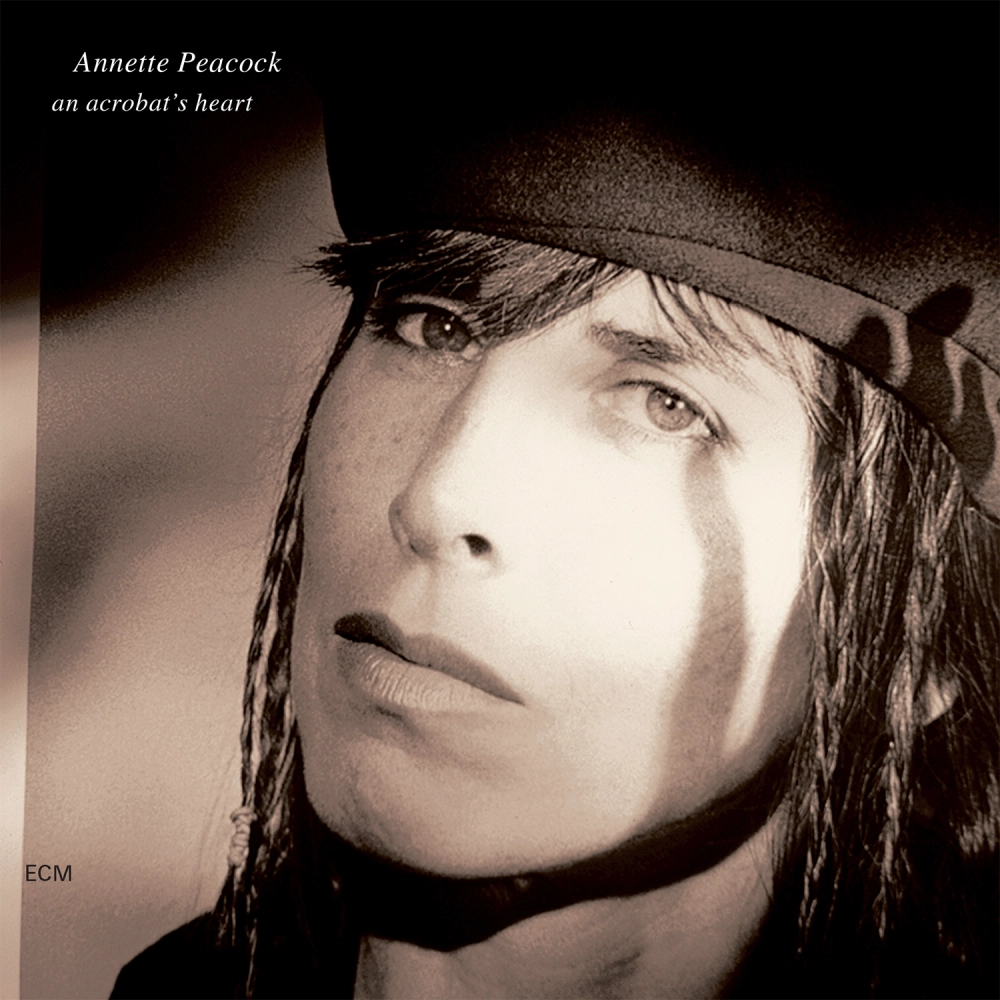an acrobat's heart
Annette Peacock
- 1Mia's Proof
05:24 - 2Tho
05:24 - 3weightless
04:42 - 4Over.
03:52 - 5as long as now
03:49 - 6u slide
04:17 - 7b 4 u said
04:42 - 8The heart keeps
03:08 - 9ways it isn't
03:50 - 10Unspoken
02:59 - 11Safe
03:29 - 12Free the memory
04:36 - 13, ever 2 b gotten.
02:53 - 14Camille
04:50 - 15Lost at Last
02:18
Annette Peacock’s long-awaited debut as a "leader" on ECM (she has always been a presence in the wings, as it were) is an exceptionally beautiful and emotionally involving album. Commissioned by ECM to write music for strings, piano and voice, Peacock has delivered what may be her most personal artistic statement to date. Soul-baring songs form the core of "An acrobat’s heart", grown-up and ruthlessly honest songs from the combat zones of relationships, songs of experience and freedom and dependency, pages from a diary. The naked truths of Peacock’s texts are set to finely-crafted settings for the Cikada quartet. The compositions, and Annette’s own, unembellished piano playing, carry forward the lyrical impulses introduced into jazz when Peacock wrote the book for the Paul Bley Trio more than 30 years ago. And her unique vocal style has grown ever more keen-edged with the years; nobody phrases like her. In brief, this is essential Annette Peacock, a great original at the peak of her powers.
"An acrobat’s heart" is the first new Annette Peacock album in more than a decade, although the long silence was broken in part by the release of the Marilyn Crispell Trio’s critically-acclaimed Nothing ever was, anyway. Music of Annette Peacock issued by ECM in 1997. Annette guested on one track on that set; England’s Avant noted that "On ‘Dreams’ the composer adds her distinctive vocals (cracked varnish over supple wood) and completely steals the show. The news that she’s preparing material for a forthcoming ECM disc is very good indeed". Reactions to "Nothing ever was, anyway" were almost unanimously positive world-wide and the recording was voted Album of the Year in France’s Jazzman magazine.
Producer Manfred Eicher first met Annette Peacock almost 35 years ago, after a concert in Montreux, where Paul Bley played her compositions. "I always liked her very personal style of writing, her songs. The simplicity, the clarity, and sometimes I’ve felt she was right at the essence of expression."
Pre-production for the present disc has extended over, literally, years. Peacock began working on the music in 1996 and was fine-tuning it right up until the eleventh hour. Annette Peacock: "Manfred proposed this string quartet idea which I thought was really intriguing. I told him I’d never written for string quartet, and he said that was fine with him. So I thought ‘OK, go for it’. I heard [in my mind] this string quartet which was just pure sound, just bow on string… And I thought…yes!"
When she arrived at Rainbow Studio she was ready, and took instantly to the Steinway piano that ECM maintains there. "It’s like a living thing", she told filmmaker Barry Hecker. "You touch it and it responds." In deference to the instrument’s history, she plays it with great sensitivity and restraint.
She remains one of the most daring of singers, her choice of notes and her almost vibratoless delivery immediately arresting. (If she were a trumpeter, she’d be Miles or Chet Baker). At the same time her tone is intimate, confessional, conveys a sense of secrets whispered.
You are currently viewing a placeholder content from YouTube. To access the actual content, click the button below. Please note that doing so will share data with third-party providers.
More InformationYou need to load content from reCAPTCHA to submit the form. Please note that doing so will share data with third-party providers.
More InformationYou need to load content from Turnstile to submit the form. Please note that doing so will share data with third-party providers.
More InformationYou are currently viewing a placeholder content from Facebook. To access the actual content, click the button below. Please note that doing so will share data with third-party providers.
More InformationYou are currently viewing a placeholder content from Instagram. To access the actual content, click the button below. Please note that doing so will share data with third-party providers.
More InformationYou are currently viewing a placeholder content from X. To access the actual content, click the button below. Please note that doing so will share data with third-party providers.
More Information



